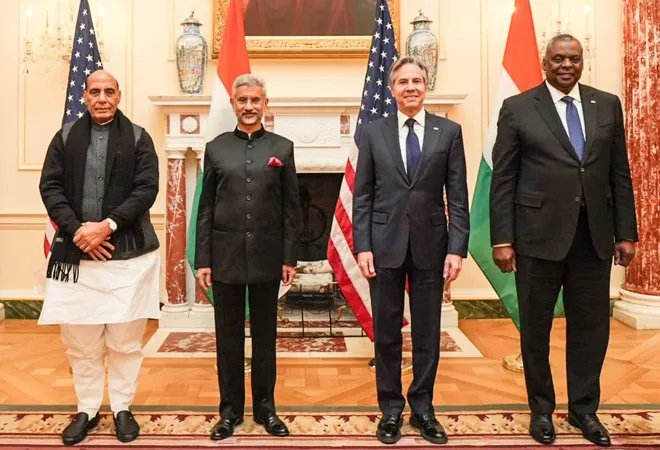
This month, the Observer Research Foundation released the 'ORF Foreign Policy Survey 2021: Young India and The World', in an effort to democratise foreign policy by getting the Indian youth’s pulse on the biggest foreign policy challenges facing India. The poll sampled 2,037 Indians aged 18-35 from 14 cities, wherein the poll was administered in eight regional languages and in English. The poll registered the Indian youth’s overall positive assessment of India’s foreign policy trajectory, with 72 percent rating it as either ‘very good’ or ‘good’.
A key undertaking of the survey pertained to mapping the Indian youth’s perceptions of major powers, whereby the United States (US) emerged as the ‘most trusted country’ with a cumulative positive response of 77 percent—with 32 percent 'trust completely' and 45 percent ‘trust somewhat’.
This trust reposed in the US is well reflected in the multifaceted state of the ‘Comprehensive Global Strategic Partnership’ between India and the US, which encompasses over 50 bilateral inter-governmental dialogues on various areas of cooperation. Moreover, the high favourability may also be attributed to the fact that Washington has been invested in New Delhi’s development goals, which renders the India–US partnership to hone an outsized potential in positively impacting the lives of a diverse cross-section of Indians.
A key undertaking of the survey pertained to mapping the Indian youth’s perceptions of major powers, whereby the United States (US) emerged as the ‘most trusted country’ with a cumulative positive response of 77 percent—with 32 percent 'trust completely' and 45 percent ‘trust somewhat’.
For instance, there are significant American development finance projects active in India’s clean energy sector, which is at the forefront of New Delhi’s efforts to exceed its green energy commitments. Over the past three years alone, the US International Development Finance Corporation has announced loans worth over US $200 million to Indian solar power producers, and pioneered long-term power purchase agreements with Indian state-run entities to provide electricity at competitive tariffs.
Furthermore, as per the survey’s findings, 78 percent of respondents deemed the US to be most likely to emerge as India’s leading partner over the next decade. This degree of confidence in the trajectory of the India–US partnership may be attributed to the US’ rising currency in various strategic dimensions of India’s foreign policy. For instance, in the past few years alone, the US peaked as India’s second largest arms supplier and emerged as the sixth largest supplier of crude.
In context of the evolving ‘great power competition’ between China and the US, 62 percent of respondents supported cooperation with the US. Although the call for such cooperation was seen to be much higher in the non-metros (65 percent) than the metros (52 percent), the general support for greater India-US engagement amid US-China tensions clearly outweighed the alternatives of remaining neutral (32 percent) or cooperating with China (mere one percent). Whereas, 70 percent of respondents expressed concern over China’s rise and 77 percent expressed distrust of Beijing (69 per cent ‘distrust completely’, and 8 percent ‘distrust somewhat’).
Although they were the unarmed version of the Predator series, the US facilitated India’s procurement of the critical platform on a lease arrangement, in an effort to support India’s reconnaissance efforts during border tensions with China.
However, as evidenced by the discussed multidimensional characteristic of the India-US partnership, the high favourability for the US amongst young Indians should not wholly be attributed to the overwhelming anti-China sentiment.
The high support in favour of India–US engagement should also be seen in context of the US delivering on the promise of the India–US partnership, especially amid tensions between India and China. For instance, the poll was conducted in December 2020, followed the India–China border conflict and came in quick succession to November 2020 reports of India inducting two American Sea Guardian drones. Although they were the unarmed version of the Predator series, the US facilitated India’s procurement of the critical platform on a lease arrangement, in an effort to support India’s reconnaissance efforts during border tensions with China.
Finally, as per the findings of the ORF Foreign Policy Survey, other western powers like the United Kingdom (UK), France, and the European Union also received high trust ratings of 61 percent, 58 percent, and 51 percent respectively. Much like the US, those western powers are also heavily invested in India’s growth story. Examples of which may range from the successful India–UK collaboration on the Covishield vaccine, and the European Investment Bank’s sizeable investments towards India’s focus on “green, safe and affordable public transport”.
France has oft-declared its steadfast support for India at global fora like the UN Security Council, against “any kind of procedural games” by China.
Furthermore, much like the India–US dynamic, India’s relations with those western powers also boast of credible precedents of cooperation against China. For instance, in 2019, France and the UK—along with the US—were reported to have expended critical diplomatic capital in support of India, against China’s technical hold on Jaish-e-Mohammed chief Masood Azhar’s listing under the UN’s 1267 Sanctions Committee. In addition, France has oft-declared its steadfast support for India at global fora like the UN Security Council, against “any kind of procedural games” by China.
Hence, the ORF Foreign Policy Survey’s findings in support for India’s ties with the US and the broader West seem to have validated Indian foreign policy’s current organising principle of seeking “an optimal mix of capabilities, relationships, and positioning”.
This article is based on the findings of the 'ORF Foreign Policy Survey 2021: Young India and The World'
The views expressed above belong to the author(s). ORF research and analyses now available on Telegram! Click here to access our curated content — blogs, longforms and interviews.




 PREV
PREV


